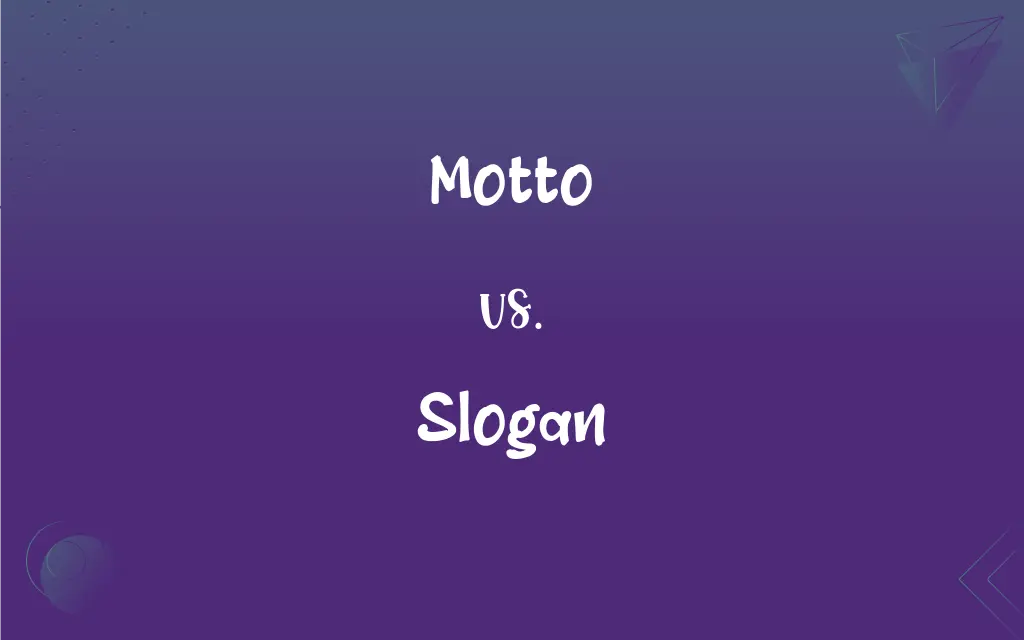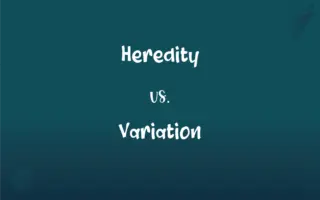Motto vs. Slogan: What's the Difference?
Edited by Aimie Carlson || By Harlon Moss || Updated on October 23, 2023
Motto is a short phrase encapsulating beliefs, while a slogan is a catchy phrase used for promotion.

Key Differences
A motto is a brief statement or phrase that expresses a principle, goal, or ideal. A slogan, on the other hand, is a catchy phrase or sentence used primarily for advertising or promoting a product, service, or cause. Both are means of conveying messages, but they serve different purposes.
A motto often serves as a guiding principle for individuals, organizations, or institutions. For instance, schools or military units might adopt mottos that reflect their core values. A slogan is more commercial in nature and is designed to be memorable to its target audience.
In terms of longevity, a motto tends to be more enduring, remaining relevant over longer periods. A slogan might change frequently, especially in the realms of advertising, to stay fresh and appealing.
When considering intent, a motto typically aims to inspire, motivate, or offer wisdom. It's a representation of one's ethos. A slogan, however, is tailored to persuade or capture attention, often with the aim of selling something or promoting a specific idea.
While a motto usually remains consistent across different languages and cultures, a slogan might be altered or translated to cater to different demographics, ensuring its effectiveness across various markets.
ADVERTISEMENT
Comparison Chart
Purpose
Expresses a principle or ideal.
Promotes a product, service, or cause.
Usage
Used by individuals, organizations, institutions.
Primarily used in advertising or marketing.
Longevity
Tends to be enduring and timeless.
Can change frequently to remain appealing.
Intent
Aims to inspire or offer wisdom.
Tailored to persuade or capture attention.
Cultural Adaptation
Generally remains consistent across languages.
Often altered or translated for different demographics.
ADVERTISEMENT
Motto and Slogan Definitions
Motto
A phrase encapsulating an individual's or group's guiding principle.
Semper Fidelis is the motto of the United States Marine Corps.
Slogan
A marketing tool designed to capture attention.
I'm Lovin' It is a globally recognized slogan for McDonald's.
Motto
A short expression of a guiding philosophy.
Carpe Diem is a popular motto meaning Seize the Day.
Slogan
A concise, repetitive phrase for commercial appeal.
The brand's slogan is Taste the Rainbow.
Motto
A concise reflection of core values or beliefs.
The country's motto is Unity in Diversity.
Slogan
A catchy phrase used for advertising or promotion.
Their new slogan for the product is Just Do It.
Motto
A statement or phrase representing an ethos or ideal.
Liberty or Death was a revolutionary motto.
Slogan
A phrase representing a commercial message or campaign.
The environmental campaign used the slogan Save the Earth.
Motto
A brief statement expressing a principle or belief.
The school's motto is Integrity Above All.
Slogan
A memorable sentence promoting a specific idea or brand.
The tourism board's slogan is Incredible India.
Motto
A brief statement used to express a principle, goal, or ideal
“We explain that when someone is cruel, or acts like a bully, you don't stoop to their level—no, our motto is ‘when they go low, we go high'” (Michelle Obama).
Slogan
A phrase expressing the aims or nature of an enterprise, organization, or candidate; a motto.
FAQs
What's a motto?
A motto is a short phrase that encapsulates a belief or principle.
Why do businesses use slogans?
Slogans are used to make a brand or product memorable and to convey its unique selling proposition.
Are mottos always serious?
While mottos often reflect core values, they can be light-hearted or humorous as well.
Can a motto be a question?
Yes, a motto can be framed as a question, though it's less common.
Do slogans need to rhyme?
While rhyming can make slogans more catchy, it's not a requirement.
Is a slogan's success measurable?
Yes, through metrics like brand recall, customer engagement, and sales.
Are mottos culturally consistent?
Generally, yes. Mottos often remain the same across languages, whereas slogans might be adapted.
Can a motto be a full sentence?
Yes, as long as it succinctly conveys a guiding principle or belief.
How are slogans created?
Slogans are often crafted by marketing teams or ad agencies, considering brand messaging and target demographics.
Should mottos always be translated verbatim?
While mottos can be translated, they often retain their original language to preserve their essence.
Can a slogan be a company's mission statement?
While related, a slogan is usually catchier and shorter than a mission statement.
Can a company have both a motto and a slogan?
Yes, a company can have a motto reflecting its values and a slogan for its advertising campaigns.
Do mottos change frequently?
Mottos tend to be enduring, whereas slogans might change to stay fresh in advertising.
Are slogans only for products?
No, slogans can promote services, causes, or even public health messages.
What's the main aim of a slogan?
The primary aim of a slogan is persuasion and capturing attention.
Do mottos have a commercial intent?
Mottos are more about expressing values or beliefs than commercial promotion, unlike slogans.
How is a slogan different from a motto?
A slogan is a catchy phrase used primarily for promotion, while a motto expresses a core belief or ideal.
Can a personal life philosophy be a motto?
Absolutely! Many people have personal mottos guiding their actions.
How vital is a memorable slogan for a brand?
A memorable slogan can significantly boost brand recall and create a lasting impression with consumers.
How long is a typical motto?
Mottos are typically concise, but there's no fixed length.
About Author
Written by
Harlon MossHarlon is a seasoned quality moderator and accomplished content writer for Difference Wiki. An alumnus of the prestigious University of California, he earned his degree in Computer Science. Leveraging his academic background, Harlon brings a meticulous and informed perspective to his work, ensuring content accuracy and excellence.
Edited by
Aimie CarlsonAimie Carlson, holding a master's degree in English literature, is a fervent English language enthusiast. She lends her writing talents to Difference Wiki, a prominent website that specializes in comparisons, offering readers insightful analyses that both captivate and inform.































































